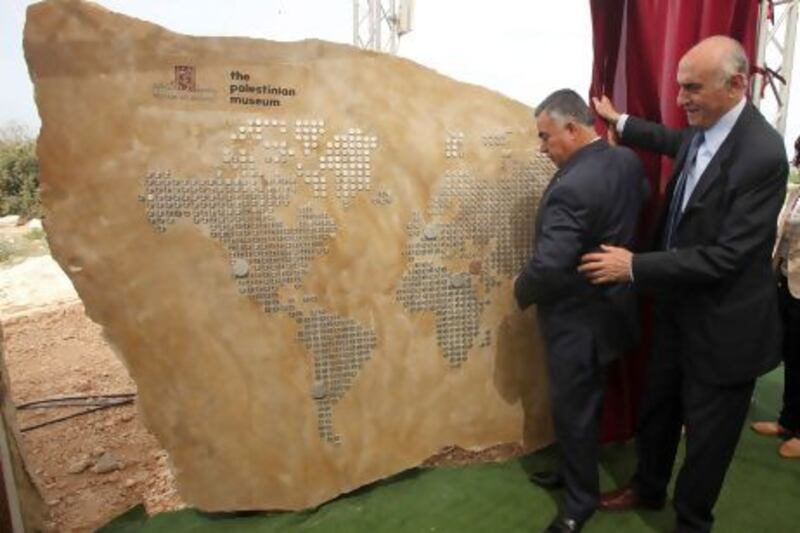BIRZEIT, WEST BANK // Politicians, businessmen and artists converged on a West Bank hilltop yesterday to lay the cornerstone of what they hope will become the pre-eminent museum of Palestinian history and culture.
When construction finishes on the Dh55 million facility late next year, the Palestinian Museum will boast an extensive virtual archive of historical documents and nearly 3,000 square metres of climate-controlled gallery space, educational classrooms and an amphitheatre.
The museum aims to be the largest showcase of Palestinian art and heritage, cultural artefacts and historical documents, said its director, Jack Persekian of the Welfare Association, the Palestinian non-profit organisation that is spearheading the project.
He described the museum as providing an innovative "snapshot of the Palestinian nation" that would be accessible, through online archives and planned satellite branches, to millions of Palestinians scattered around the world, in refugee camps and in the Israeli-occupied territories.
"This museum will try to transcend these borders and obstacles that Palestinians around the world face," Mr Persekian told reporters at yesterday's ceremony.
To be built on a four-hectare tract of land just north of the Palestinian Authority's administrative capital of Ramallah, the Palestinian Museum also plans to have gardens with highland views that reach as far as the Israeli city of Tel Aviv. Museum officials plan to double the facility's size in 10 years, adding a library, more gallery space and an auditorium.
The project has received financial support from philanthropists and businessmen, including Munib Al Masri, chairman of the powerful Palestine Development and Investment Company conglomerate.
Mr Al Masri called the museum "a wonderful testimony to Palestinian steadfastness" against Israel's occupation of the West Bank, Gaza Strip and East Jerusalem, areas wanted for a Palestinian state. He also lamented Israel's refusal to allow the museum to be constructed in Jerusalem, the Palestinian cultural and spiritual capital.
Israel annexed the city as the "undivided, eternal capital of the Jewish people".
"I wanted the museum to be in Jerusalem, but this dream was shattered by Israel," Mr Al Masri said in a text message to The National.
Museum officials say its facilities have been specially designed to cater to a stateless and geographically fragmented people. They have contemplated building dozens of satellite branches in cities in the West Bank and Gaza Strip, as well as in Europe and the United States. Due to Israeli checkpoints and other restrictions, they say, the museum would essentially take its content to audiences.
Fatin Farhat, head of the Ramallah municipality's cultural department, said the project was essential for preserving Palestinian heritage against Israel. The archive would contain photos, land deeds and other documents demonstrating the Palestinian connection to the land before Israel's creation in 1948, when Jewish authorities began forcibly relocating Palestinians abroad and confiscating their land.
"The idea is to first document Palestinian intangible heritage, which has been subjected to constant negation by the occupation," Mrs Farhat said.
Until recently, she added, the Palestinians have "had a major shortcoming in terms of documenting and preserving our own heritage".
hnaylor@thenational.ae
twitter: For breaking news from the Gulf, the Middle East and around the globe follow The National World. Follow us





